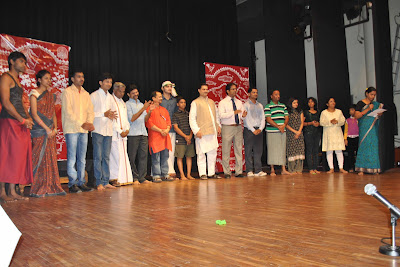The Delhi Kannada Education Society (DKES) a registered society established in 1959 by founder President late Shri S V Krishna Murthy Rao, the then Deputy Chairman, Rajya Sabha inaugurated Delhi Kannada School in 1961. The Society established School of Computer Science in 2003 which runs MCA course approved by AICTE.
The Society takes immense pleasure in announcing that Delhi Kannada School has just completed 50 years of its valuable service and contributions towards education in the capital city of India-Delhi, since its inception on Vijaya Dashami Day in the year 1961.
The DKES, therefore, has already taken a step ahead by inaugurating Golden Jubilee functions on 17th October, 2010, with Sharada Pooja, felicitation to the first batch of the students, founder teachers and life members who were involved in the inauguration of the school. We held year long functions including seminars, inter-school competitions, cultural programmes and programmes for Alumni of school.
Fifty years ago on this auspicious day, it formally opened with ten students on its roles. DKS began with one teacher-cum-principal along with a clerk to help him to set up the school in October 1961. In contrast, today DKS, after fifty years of its fruitful existence, has grown into a big school with about 1000 students on its roles and with more than sixty teachers, including staff taking care of various aspects of the School. No doubt, it was long journey for the DKS and this journey was facilitated by numerous enlightened, forward-looking and above all passionate Kannadigas.
The School is run in a co-educational system with more than 1000 students coming from various parts of Delhi. Though primacy in admission is given to Kannadigas, the students from other States, including Delhi are also admitted. The four languages taught in the School are Kannada, Hindi, Sanskrit and English. Though medium of instruction is English, Kannada is compulsorily taught from class I to V to all children with provision upto class XII as optional subject. The School has maintained steady progress since beginning in both curricular and extra-curricular activities. The School children, with assistance of excellent teachers, have excelled in various activities. Delhi Kannada School is regarded as one of the best schools in its Zone. The results of the School have also been consistently good.
The infrastructure of the School is excellent and it is being regularly updated. At present, there are about 40 class rooms. Besides these, there is a well-equipped library hall, a science lecture hall and separate laboratories for physics, chemistry and biology. There is a vast play ground for children to play which needs refurbishing.
There is a provision for canteen and health clinic. Besides this, the School has several activities such as - house system, scouts and guides unit, art and painting, yoga and music teaching, debating houses and other facilities.
Though the above facilities have been realized, some are yet to be realized and it is hoped that these will take shape in future. These initiatives need brief mention and these are:
The idea of expanding the area of School and its play ground is still in the process of realization. If the vacant land adjacent to the School is made available this dream could be realized. Successive Boards of Management have taken up this initiative and hopefully we will be able to get this additional land, subject to availability and as per existing Governmental norms and regulations;
Need to build additional class rooms, science labs and strengthen the existing infrastructure in the Golden Jubilee year by adding new furniture, computers and other learning equipments for children;
Construction of a well-equipped auditorium and activity hall; this would require huge resource mobilization and assistance from the Government of Karnataka and Delhi Government;
Equipping playground with all-weather Basket Ball and Badminton Courts;
Opening the branches of Delhi Kannada School at different parts of Delhi, (such as Dwarka/Janakpuri, Mayur Vihar and such other places as to be specified) to facilitate the children of Delhi Kannadigas;
Opening of a management and vocational institute to provide for job-oriented programmes.
With the co-operation of Hon’ble Members of Delhi Kannada Education Society, eminent Kannadigas, Govt. of Karnataka, Govt. of NCT of Delhi and General Public we are sure to achieve the aims of objectives of the society.
The School is organizing Golden Jubilee on 11.12.2011.

































































